九年级英语第十二单元
九年级英语unit12单元知识点
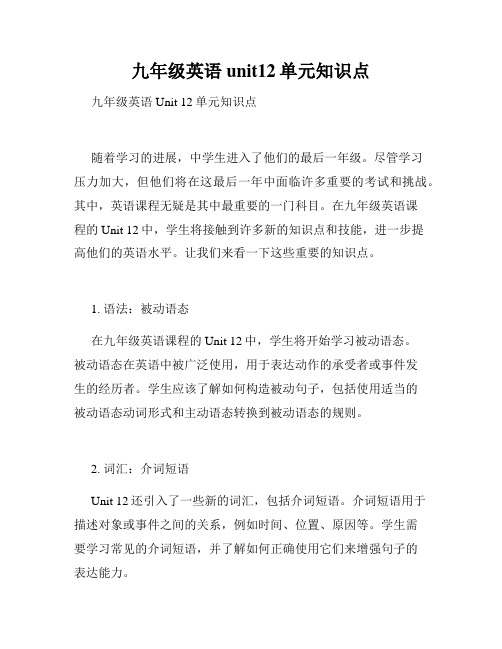
九年级英语unit12单元知识点九年级英语Unit 12单元知识点随着学习的进展,中学生进入了他们的最后一年级。
尽管学习压力加大,但他们将在这最后一年中面临许多重要的考试和挑战。
其中,英语课程无疑是其中最重要的一门科目。
在九年级英语课程的Unit 12中,学生将接触到许多新的知识点和技能,进一步提高他们的英语水平。
让我们来看一下这些重要的知识点。
1. 语法:被动语态在九年级英语课程的Unit 12中,学生将开始学习被动语态。
被动语态在英语中被广泛使用,用于表达动作的承受者或事件发生的经历者。
学生应该了解如何构造被动句子,包括使用适当的被动语态动词形式和主动语态转换到被动语态的规则。
2. 词汇:介词短语Unit 12还引入了一些新的词汇,包括介词短语。
介词短语用于描述对象或事件之间的关系,例如时间、位置、原因等。
学生需要学习常见的介词短语,并了解如何正确使用它们来增强句子的表达能力。
3. 阅读理解:科技与未来英语课程的Unit 12涵盖了科技与未来的主题。
学生将会读到一些与科技和未来发展相关的文章,包括科技创新、环境可持续性等方面的内容。
通过阅读这些文章,学生将进一步培养他们的阅读理解能力,并学会如何从文章中找到关键信息。
4. 写作技巧:写一篇科技发展的短文在Unit 12的写作任务中,学生将被要求写一篇关于科技发展的短文。
他们需要展示对科技发展趋势的理解,并提出自己的观点和看法。
这个任务将帮助学生提高他们的写作技巧,同时培养他们的逻辑思维和表达能力。
5. 口语表达:讨论和辩论在Unit 12的口语任务中,学生将分组进行讨论和辩论。
他们将就科技与未来的话题展开思考,提出自己的观点,并试图说服别人。
这个任务将帮助学生提高他们的口语表达能力,并锻炼他们的团队合作和交流技巧。
总的来说,九年级英语Unit 12提供了丰富的学习内容,包括语法、词汇、阅读理解、写作和口语表达等方面的知识点。
学生需要努力学习和掌握这些知识点,以便在最后一年中取得进一步的提高。
九年级英语Unit 12 知识点

九年级英语Unit 12 知识点Unit 12 Knowledge Points in Grade Nine EnglishIntroductionIn the ninth-grade English curriculum, Unit 12 covers various knowledge points. This unit aims to strengthen students' language skills, enhance their understanding of different contexts, and expand their vocabulary. In this article, we will explore some key aspects of Unit 12, providing a comprehensive overview that will assist students in their language acquisition journey.Listening SkillsLanguage learning involves effective listening, which is a foundational skill. Unit 12 emphasizes the development of listening comprehension. To improve this skill, students can engage in activities such as listening to podcasts, watching movies or TV shows in English, and participating in group discussions. Through these activities, students can familiarize themselves with different accents, colloquial expressions, and intonation patterns.Reading SkillsIn Unit 12, students will encounter a variety of reading materials, including narrative texts, articles, and nonfiction passages. To enhance reading skills, it is important to practice extensive reading. Students can select books or articles of interest, read newspapers, or explore online resources to broaden their exposure to different topics and writing styles. Additionally, they should focus on comprehension and develop strategies such as skimming, scanning, and predicting to enhance their reading speed and overall understanding.Writing SkillsUnit 12 aims to improve students' writing skills by introducing various writing tasks. These tasks may include writing essays, formal letters, or informal emails. To excel in writing, students should develop a systematic approach. Planning the structure of their writing, brainstorming ideas, and organizing content in a logical manner are important steps. Moreover, practicing different writing styles and adopting appropriate vocabulary and grammar will enhance the effectiveness and coherence of their written work.GrammarGrammar plays a crucial role in language proficiency. Unit 12 focuses on various grammar structures such as passive voice, reported speech, and conditional sentences. To master these structures, studentsshould practice actively, working on exercises that target each specific grammar point. Additionally, they can review grammar rules through online resources, textbooks, or seek guidance from their teachers.Vocabulary ExpansionExpanding vocabulary is essential for effective communication. Unit 12 introduces new vocabulary related to various topics, such as travel, technology, and education. To enhance vocabulary, students can create flashcards, categorize words into groups, or use online tools and apps designed for language learning. Incorporating new words into daily conversations and writing will also help students reinforce their understanding and application of vocabulary.Speaking SkillsDeveloping speaking skills is integral to real-life communication. Unit 12 provides opportunities for students to engage in discussions, debates, and presentations. To improve speaking abilities, students should actively participate in class activities and engage in conversations with classmates and teachers. Taking advantage of language exchange programs, language clubs, or practicing with language-learning apps will also provide additional platforms for oral practice.ConclusionUnit 12 in the ninth-grade English curriculum covers a range of essential knowledge points. By focusing on listening skills, reading skills, writing skills, grammar, vocabulary expansion, and speaking skills, students can enhance their overall language proficiency. Continuous practice, utilizing various resources, and seeking guidance from teachers will undoubtedly guide students towards mastering the content of Unit 12 and becoming more confident English speakers and writers.。
人教版九年级全册英语第十二单元Unit12《单词+短语+句子》默写专项练习(含答案)

UNIT 12 Life is full of the unexpected.
Section A(1a-4c)
[限时:15分钟]
重点单词
1. adj. 出乎意料的;始料不及的
2. v. 睡过头;睡得太久
3. n. 街区
4. v. 着火;燃烧
5. adj. 活着;有生气的
6. n. 市场;集市
7. n. 背包;旅行包8. n. 工作者;工人
9. v. 盯着看;凝视
10. prep. 在……上面adv. 在上面
11. n. 机场
12. prep. & conj. 到;直到
13. adv. 向西;朝西adj. 向西的;西部的n. 西;西方
14. n. 豆;豆荚15. n. 奶油;乳脂
16. adj. 死的;失去生命的
词形变换
1. expect —(形容词)—(反义词)
2. oversleep—(过去式/过去分词)
3. burn—(过去式)—(过去分词)—(形容词)
4. fool—(形容词)
5. belief—(反义词)
重点短语
1. 在……以前
2. 捎……一程
3. 与……成一排
4. 盯着看;凝视
5. 突然响起;发出声音
6. 冲出;奔出
7. 洗淋浴8. 从……跳起来
9. 充满
10. 排队等候
1/ 6。
九年级英语unit12知识点总结
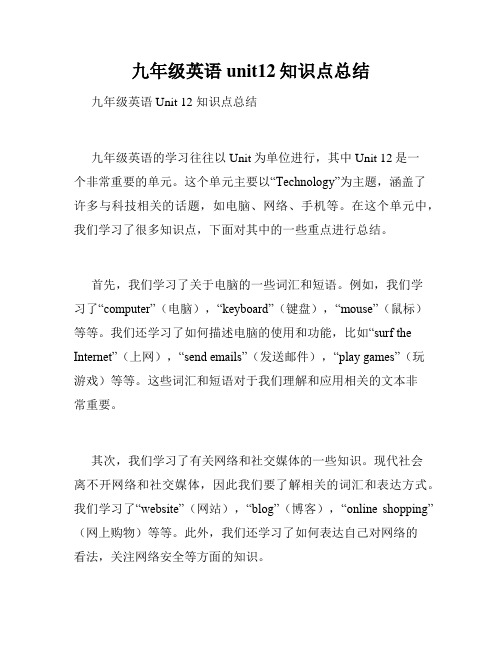
九年级英语unit12知识点总结九年级英语Unit 12 知识点总结九年级英语的学习往往以Unit为单位进行,其中Unit 12是一个非常重要的单元。
这个单元主要以“Technology”为主题,涵盖了许多与科技相关的话题,如电脑、网络、手机等。
在这个单元中,我们学习了很多知识点,下面对其中的一些重点进行总结。
首先,我们学习了关于电脑的一些词汇和短语。
例如,我们学习了“computer”(电脑),“keyboard”(键盘),“mouse”(鼠标)等等。
我们还学习了如何描述电脑的使用和功能,比如“surf the Internet”(上网),“send emails”(发送邮件),“play games”(玩游戏)等等。
这些词汇和短语对于我们理解和应用相关的文本非常重要。
其次,我们学习了有关网络和社交媒体的一些知识。
现代社会离不开网络和社交媒体,因此我们要了解相关的词汇和表达方式。
我们学习了“website”(网站),“blog”(博客),“online shopping”(网上购物)等等。
此外,我们还学习了如何表达自己对网络的看法,关注网络安全等方面的知识。
在这个单元中,我们还学习了关于手机的一些知识。
手机在今天的生活中起着重要的作用,因此我们要了解一些与手机相关的词汇和表达方式。
我们学习了“mobile phone”(手机),“text messages”(短信),“call someone”(给某人打电话)等等。
我们还学习了如何描述手机的功能和使用方式,以及如何使用手机进行沟通和交流。
除了学习具体的词汇和短语,我们还学习了一些语法知识。
比如,我们学习了“used to +动词原形”和“be used to +动名词/名词短语”,用来描述过去的习惯和适应现状。
我们还学习了“too + 形容词/副词”和“enough + 名词”,用来描述程度。
在这个单元的学习中,我们还参与了一些小组活动和讨论,练习了口语和写作能力。
新目标九年级英语unit12知识点汇总
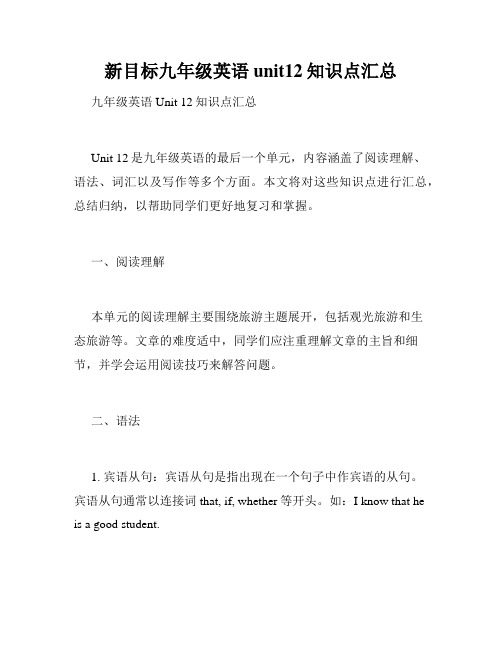
新目标九年级英语unit12知识点汇总九年级英语Unit 12知识点汇总Unit 12是九年级英语的最后一个单元,内容涵盖了阅读理解、语法、词汇以及写作等多个方面。
本文将对这些知识点进行汇总,总结归纳,以帮助同学们更好地复习和掌握。
一、阅读理解本单元的阅读理解主要围绕旅游主题展开,包括观光旅游和生态旅游等。
文章的难度适中,同学们应注重理解文章的主旨和细节,并学会运用阅读技巧来解答问题。
二、语法1. 宾语从句:宾语从句是指出现在一个句子中作宾语的从句。
宾语从句通常以连接词that, if, whether等开头。
如:I know that he is a good student.2. 将来进行时:将来进行时表示将来某个时间正在进行的动作或某个未来的事件。
构成:will be + 动词ing。
如:They will be watching a movie at this time tomorrow.3. 动词不定式的被动语态:动词不定式的被动语态由to be + 过去分词构成。
如:The problem needs to be solved.4. 特殊疑问句:特殊疑问句用来询问某个具体的信息,常见的特殊疑问词有:what, who, when, where, why, how等。
如:What time is it?三、词汇1. 旅游相关词汇:tourist, travel, destination, attraction, guide, sightseeing等。
2. 计量词:本单元涉及了一些计量词,如:a pair of, a group of,a piece of等。
在使用时要注意与名词的搭配。
3. 形容词和副词:学习一些形容词和副词可以丰富语言表达,如:breathtaking, fascinating, slightly等。
四、写作本单元的写作任务是写一篇关于英国旅游的文章。
写作时可以运用所学的词汇和语法知识,通过添加细节和论述观点来丰富文章。
九年级全一册英语Unit12知识点归纳
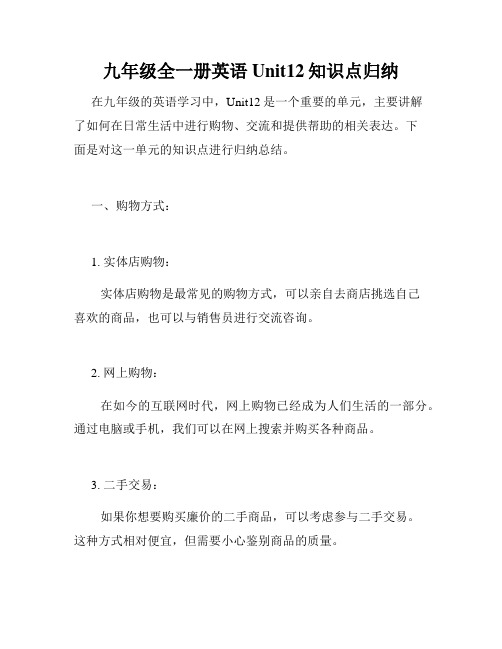
九年级全一册英语Unit12知识点归纳在九年级的英语学习中,Unit12是一个重要的单元,主要讲解了如何在日常生活中进行购物、交流和提供帮助的相关表达。
下面是对这一单元的知识点进行归纳总结。
一、购物方式:1. 实体店购物:实体店购物是最常见的购物方式,可以亲自去商店挑选自己喜欢的商品,也可以与销售员进行交流咨询。
2. 网上购物:在如今的互联网时代,网上购物已经成为人们生活的一部分。
通过电脑或手机,我们可以在网上搜索并购买各种商品。
3. 二手交易:如果你想要购买廉价的二手商品,可以考虑参与二手交易。
这种方式相对便宜,但需要小心鉴别商品的质量。
二、购物时的交流:1. 询问价格:如果你对某个商品感兴趣,可以使用以下表达方式询问价格: - How much is this/that?- How much does it cost?- What's the price?2. 购买商品:当你决定购买某个商品时,可以使用以下表达方式:- I'll take this/that one.- I want to buy this/that one.- I'd like to purchase this/that one.3. 比较商品:在购物时,我们常常需要比较不同商品的特点和价格。
以下表达方式可以帮助你进行比较:- Which one is cheaper, this one or that one?- What's the difference between this one and that one?- I think this one is better because...4. 付款方式:购物时,需要选择合适的付款方式。
以下是常见的付款方式: - Can I pay in cash?- Do you accept credit cards?- Can I use mobile payment like Alipay or WeChat Pay?5. 请求帮助:如果你在购物过程中遇到问题,可以用以下表达方式请求帮助:- Excuse me, can you help me?- Could you please assist me?- I need your help.三、购物中的礼貌用语:1. 感谢和道别:在购物过程中,我们要学会用礼貌的方式表达感谢和道别: - Thank you for your help.- Thanks a lot.- Have a nice day!2. 道歉和请求:如果我们在购物中犯了错或者需要别人帮助,要学会道歉和请求:- I'm sorry for the inconvenience.- Could you please help me with this?- I apologize for the mistake.四、购物时遇到的问题和解决办法:1. 商品不满意:如果购买的商品有质量问题或者与描述不符,可以进行退货或者换货:- I want to return this product because it's broken.- This item is not what I expected. Can I exchange it for another one?- Can I have a refund?2. 付款问题:在付款时可能会出现问题,可以寻求帮助解决:- I'm having trouble with the payment. Can you help me?- My credit card is not working. Is there another way to pay?- The payment machine is not giving me a receipt. What should I do?在Unit12的学习中,我们学到了购物的方式、交流技巧以及解决问题的方法,这些知识对我们日常的生活和未来的职业发展都具有重要意义。
九年级英语十二单元2b知识点
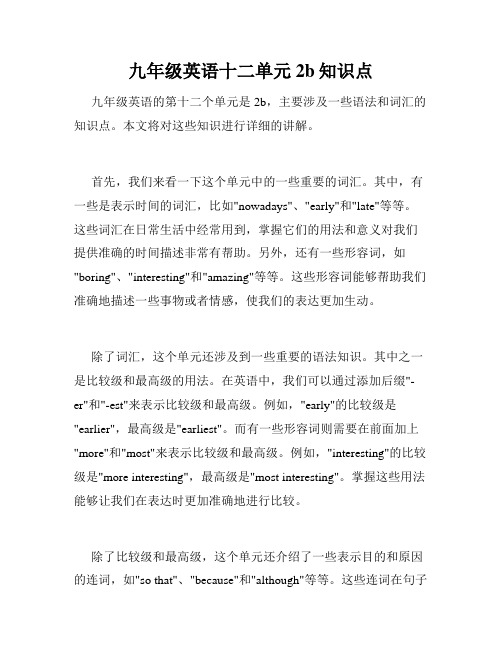
九年级英语十二单元2b知识点九年级英语的第十二个单元是2b,主要涉及一些语法和词汇的知识点。
本文将对这些知识进行详细的讲解。
首先,我们来看一下这个单元中的一些重要的词汇。
其中,有一些是表示时间的词汇,比如"nowadays"、"early"和"late"等等。
这些词汇在日常生活中经常用到,掌握它们的用法和意义对我们提供准确的时间描述非常有帮助。
另外,还有一些形容词,如"boring"、"interesting"和"amazing"等等。
这些形容词能够帮助我们准确地描述一些事物或者情感,使我们的表达更加生动。
除了词汇,这个单元还涉及到一些重要的语法知识。
其中之一是比较级和最高级的用法。
在英语中,我们可以通过添加后缀"-er"和"-est"来表示比较级和最高级。
例如,"early"的比较级是"earlier",最高级是"earliest"。
而有一些形容词则需要在前面加上"more"和"most"来表示比较级和最高级。
例如,"interesting"的比较级是"more interesting",最高级是"most interesting"。
掌握这些用法能够让我们在表达时更加准确地进行比较。
除了比较级和最高级,这个单元还介绍了一些表示目的和原因的连词,如"so that"、"because"和"although"等等。
这些连词在句子中起到连接不同部分的作用,使句子更加流畅和连贯。
同时,它们也是我们表达目的和原因的重要工具。
通过运用这些连词,我们能够清晰地表达我们的意思,并使读者更好地理解我们的观点。
英语九年级第12单元单词人教版
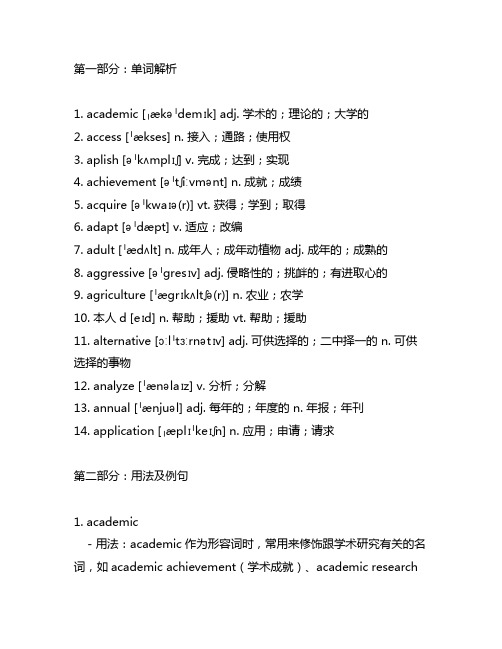
第一部分:单词解析1. academic [ˌækəˈdemɪk] adj. 学术的;理论的;大学的2. access [ˈækses] n. 接入;通路;使用权3. aplish [əˈkʌmplɪʃ] v. 完成;达到;实现4. achievement [əˈtʃiːvmənt] n. 成就;成绩5. acquire [əˈkwaɪə(r)] vt. 获得;学到;取得6. adapt [əˈdæpt] v. 适应;改编7. adult [ˈædʌlt] n. 成年人;成年动植物 adj. 成年的;成熟的8. aggressive [əˈɡresɪv] adj. 侵略性的;挑衅的;有进取心的9. agriculture [ˈæɡrɪkʌltʃə(r)] n. 农业;农学10. 本人d [eɪd] n. 帮助;援助 vt. 帮助;援助11. alternative [ɔːlˈtɜːrnətɪv] adj. 可供选择的;二中择一的 n. 可供选择的事物12. analyze [ˈænəlaɪz] v. 分析;分解13. annual [ˈænjuəl] adj. 每年的;年度的 n. 年报;年刊14. application [ˌæplɪˈkeɪʃn] n. 应用;申请;请求第二部分:用法及例句1. academic- 用法:academic作为形容词时,常用来修饰跟学术研究有关的名词,如academic achievement(学术成就)、academic research(学术研究)等。
- 例句:He has made significant academic achievements in the field of physics.(他在物理学领域取得了显著的学术成就。
)2. access- 用法:access作为名词时,常表示“接入”或“通路”的意思;作为动词时,表示“使用权”或“接近”的意思。
- 1、下载文档前请自行甄别文档内容的完整性,平台不提供额外的编辑、内容补充、找答案等附加服务。
- 2、"仅部分预览"的文档,不可在线预览部分如存在完整性等问题,可反馈申请退款(可完整预览的文档不适用该条件!)。
- 3、如文档侵犯您的权益,请联系客服反馈,我们会尽快为您处理(人工客服工作时间:9:00-18:30)。
九年级英语第12单元诊断性自测题Unit 12 Life is full of the unexpected.I. 单项填空。
( )1. — What would you like for breakfast?—I’d like some milk and pie.A. a; theB. a; /C. /; aD. the; a( )2. — Is Mount Tai the highest mountain in Shandong?— I think so. It is 1,545 meters sea level.A. underB. aboveC. pastD. along( )3. — After being trapped (困住) for 36 days, Strong Pig was still when people found it.— It was great news.A. aliveB. livelyC. livedD. live( )4. — Columbus was a man who changed the world.— I agree. His of America was one of the greatest events in human history.A. inventionB. discoveryC. appearanceD. agreement( )5. — Is the airport closed because of the bad weather?— No. But my flight to Beijing was because of it.A. lockedB. bookedC. lostD. cancelled( )6. — Did Mrs. Smith call you yesterday?— Yes. I was about for lunch when the telephone rang.A. going outB. to going outC. to go outD. go out( )7. — I want to buy a ticket to the movie.— Sorry, we have all the tickets.A. put awayB. given upC. given awayD. sold out( )8. —James said he would come to my party, but he didn’t .—Really? He didn’t keep his word again.A. show upB. get upC. set upD. give up( )9. — I must go home. — If you must, at least wait the rain stops.A. sinceB. asC. tillD. when( )10. — How it was when I fell down in front of so many people.— Well, everyone can fall, right?A. embarrassB. embarrassingC. embarrassesD. embarrassed( )11. — Do you know who the award will go to?— I have no idea. We have to wait until the result .A. announcesB. will announceC. will be announcedD. is announced ( )12. — Was it your first visit to the museum?— No. I had visited it . But I thought it worth a second visit.A. a day agoB. next weekC. the following dayD. the day before ( )13. —You did go to see “The Hunger Games 3” yesterday even ing?—No. I it already.A. seeB. had seenC. have seenD. would see( )14. — Do you know when you arrived?— Five minutes. I missed something exciting.A. how long the show had been onB. how long had the show been onC. how long has the show been onD. how long the show has been on( )15. — Barcelona lost the match last night.—It is unbelievable. They always win.A. How come?B. Never mind.C. I can’t agree more.D. That’s common.II. 词形转换。
用括号内所给单词的适当形式填空,每空格限填一词。
1. The noodles that my mother cooks are _____________ (delicious) in the world.2. He felt __________ (lucky) that day because he lost his money on the train.3. There are __________ (hundred) of people dancing on the square now.4. The box is ___________ (fill) of books and letters.5. I have to eat lunch __________ (quick) because they are all waiting for me.6. My father works at __________ (little) ten hours every day.7. Ten years _________ (late), the girl became a college student.8. The problem ___________ (unexpected) turned into a good thing.9. What time do you get _________ (dress) every morning?10. They were __________ (real) interested in ping-pong at that time.III. 动词应用。
用括号内所给动词的适当形式填空,必要时可加助动词或情态动词。
1. If you keep _________ (work) hard, you will succeed in the end.2. When he was about __________ (leave) home, he saw a stranger come into the house.3. Have you finished __________ (read) the book?4. He had a chance _________ (learn) French in Paris last year, but he had to give it up because of his illness.5. The farmer said he would stop __________ (grow) apples because they were too cheap.6. They __________ (begin) to work before I arrived there.7. The girl said that she __________ (finish) her homework before four o’clock that afternoon.8. I don’t think what he said is __________ (believe). He is a man who often tells lies.9. I _________ (fool) by my best friend on April Fool’s Day last year. I want to play a joke on her this year.10. The movie has a bad _________ (end), many audiences cried in the theatre.IV. 完成句子。
根据所给汉语提示完成英语句子,每空一词。
1. 当我起床的时候,父母已经离开家去上班了。
_________ ________ _________ I got up, my parents _________ ________ home to work. 2. 他飞快地穿上衣服跑出门去。
He quickly ________ ________ his clothes and ________ _________ the door.3. 对不起,你能捎我一段路程吗?Excuse me, can you _________ me _________ __________?4. 我们带着怀疑的目光看着黑烟正从燃烧的大楼上方升起来。
We stared _________ ________ at the black smoke _________ above the burning building. 5. 或许你的坏运气会变成好事呢。
Maybe your bad luck will _________ ________ a good thing.V. 阅读理解。
ATable manners are how to behave when you eat a meal. Different countries have different table manners. Now let’s see how to eat in public in the following countries.JapanIt is okay to make some noises when you eat noodles in Japan. Unlike making big noises, making some noises is not rude but is a compliment to the chef. The Japanese also say it tastes better if you make some noises.What else to watch: It’s important to say “thanks” before and after a meal.FranceIn France, a meal is like a ceremony(典礼). People enjoy it and make it a special event. You should never discuss money or religion (宗教信仰) over dinner, and going Dutch (各自付账) is not very polite.What else to watch: You need to finish everything on your plate.MexicoIn Mexico, whenever you catch the eye of someone who’s eating, even a stranger, it’s good manners to say “provecho”, which means “enjoy”.What else to watch: Where you sit matters in this country. Before you get seated, look for place cards, or wait until the host seats you. And you m ust say “enjoy your meal” before you leave the table.根据短文内容,选择最佳选项。
